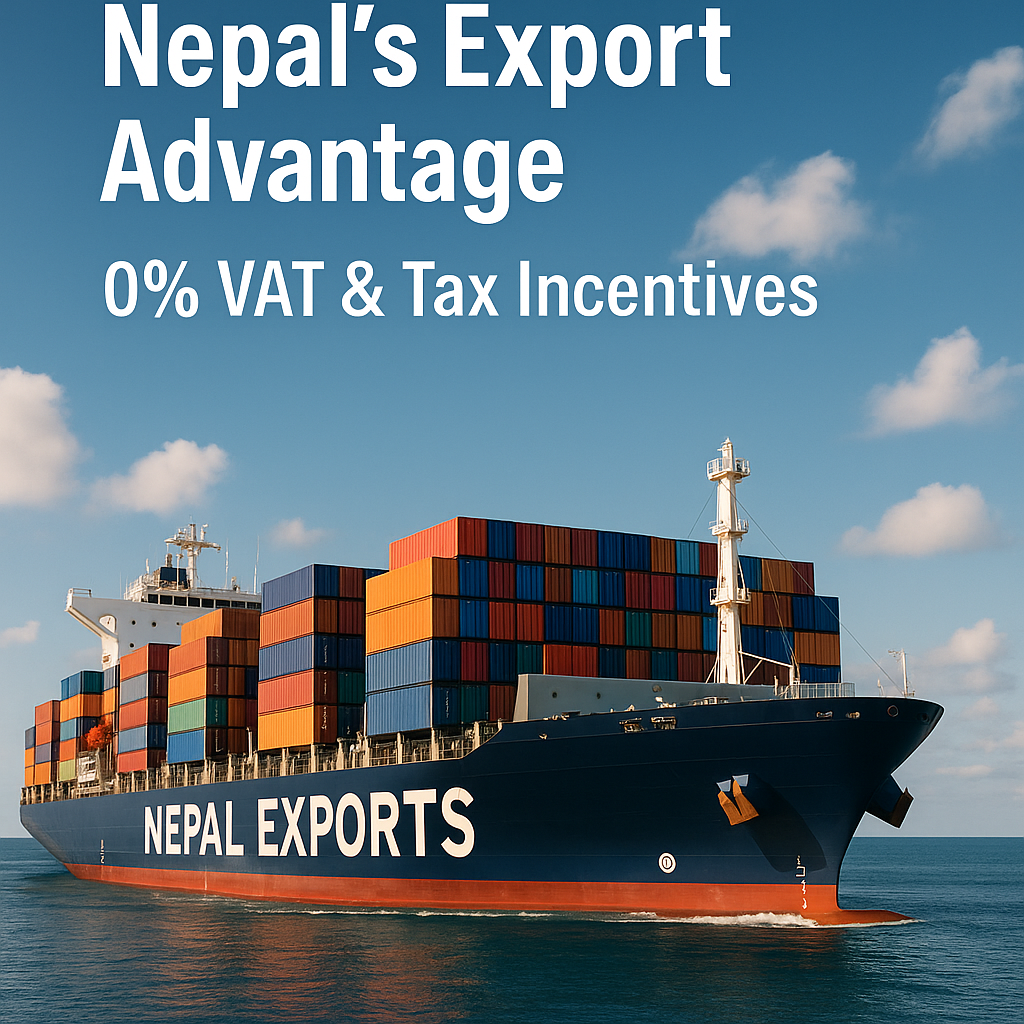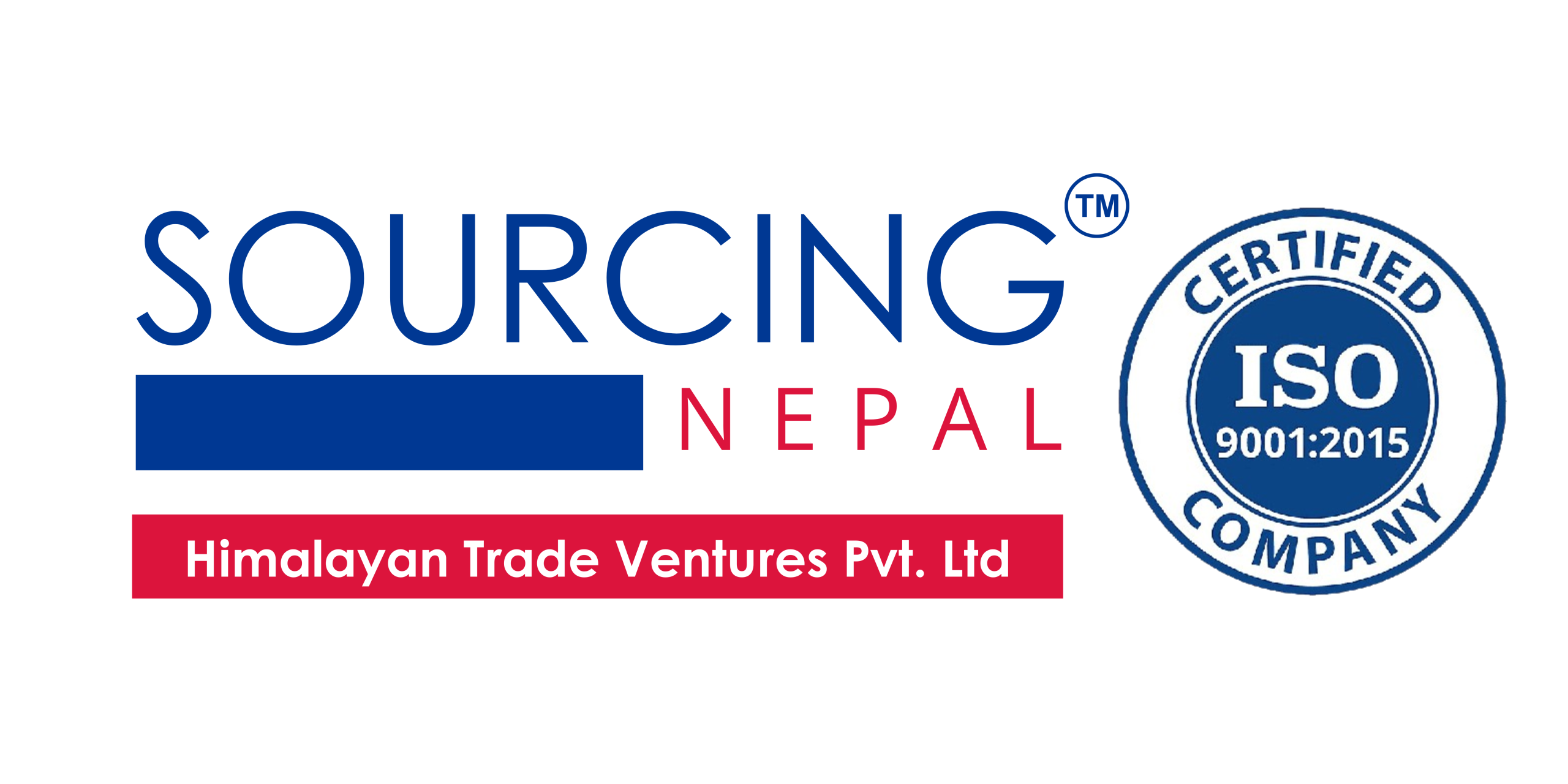- Home
- About
- Products
- Services
- Sustainable, Ethical Sourcing & Compliance
- Production scheduling and Expediting
- Supplier Verification
- Product Testing
- Quality Control
- Sample Development
- Packaging Sourcing & Development
- Drop Shipping & Amazon Fulfillment
- International Logistics
- Impact Reporting
- Branded Merchandise
- Product Photography
- Vendor Enrollment
- Policies
- Blog
- Contact Us
- Home
- About
- Products
- Services
- Sustainable, Ethical Sourcing & Compliance
- Production scheduling and Expediting
- Supplier Verification
- Product Testing
- Quality Control
- Sample Development
- Packaging Sourcing & Development
- Drop Shipping & Amazon Fulfillment
- International Logistics
- Impact Reporting
- Branded Merchandise
- Product Photography
- Vendor Enrollment
- Policies
- Blog
- Contact Us
Key Benefits for Nepalese Exporters: Tax Incentives, 0% VAT, and More
- Sourcing Nepal | Best Sourcing Company in Nepal
- Sourcing Facts
- Key Benefits for Nepalese Exporters: Tax Incentives, 0% VAT, and More

Key Benefits for Nepalese Exporters: Tax Incentives, 0% VAT, and More
Introduction
Exporting goods from Nepal has never been more beneficial for businesses looking to expand globally. The Nepalese government offers a range of attractive incentives that help exporters reduce costs, maximize profits, and compete in international markets. From lower tax rates to 0% VAT on exports and cash incentives, these benefits make Nepal an appealing destination for international trade. At Sourcing Nepal, we specialize in connecting local producers with global buyers. Our goal is to help businesses navigate the complexities of international trade while taking full advantage of the financial benefits offered by the government. In this blog, we will explore the key benefits that exporters can leverage, including tax incentives, VAT exemptions, and government support to boost their business growth and profitability
1. Lower Tax Rates For Exporters
Nepal has created a conducive tax environment for export-oriented businesses to help them stay competitive on the global stage.
Key Tax Benefits:
• Reduced Income Tax Rate: Exporters in Nepal can benefit from a lower corporate tax rate of 20% on export income, significantly reducing their overall tax liability. This enables businesses to allocate resources more effectively toward scaling operations or improving product quality.
• Tax Holidays for SEZs: Companies operating in Special Economic Zones (SEZs) can enjoy tax holidays for the first five years of operations, followed by a 50% tax concession for the next three years.
Although these tax policies have remained favorable, tax rates and incentives are subject to revisions. Exporters should always refer to the latest updates from Nepal’s Inland Revenue Department to stay informed
2. 0% VAT On Exported Goods
One of the most significant benefits for exporters in Nepal is the 0% Value Added Tax (VAT) on exported goods. This provides exporters with a competitive edge by reducing costs and making Nepalese products more affordable in international markets.
Advantages of 0% VAT:
• Lower Costs: With no VAT on exports, businesses can lower their pricing, which is essential for competing in global markets. This translates to more cost-effective operations for exporters.
• Improved Cash Flow: Exporters can benefit from VAT refunds on raw materials and other inputs used in production. This means they can improve their cash flow and reinvest those funds into expanding their business.
This VAT exemption continues to be in effect, offering a substantial advantage for Nepalese exporters
3. Government Cash Incentives for Exporters
The government of Nepal offers cash incentives designed to encourage businesses to add value to their products within the country. These incentives are based on the domestic value addition of goods being exported. The more local materials used in production, the higher the incentive, helping to boost Nepal’s domestic industries and create a more competitive export market.
Current Incentives:
• 4% Cash Incentive: For products with 30% domestic value addition.
• 5% Cash Incentive: For products with 50% or more domestic value addition.
• Additional 1%: For exporters who show 20% growth or who have a collective trademark.
• 8% Cash Incentive: For high-value products generating over Rs 500 million in export revenue.
New Policy Update for 2022/23: Enhanced Cash Subsidies In line with its commitment to fostering the growth of export businesses, the Nepalese government has introduced important changes in the cash subsidy scheme for exporters. Under the 2022/23 budget, the government has increased the cash subsidies from 3-5% to 4-8%, making it even more lucrative for businesses that add value locally.
Expanded Eligibility Criteria
The revised policy now broadens the list of eligible goods for cash incentives. A total of 18 goods have been included under this scheme, which includes sectors such as cement, steel, footwear, processed water, and IT-related services. To qualify for these incentives, the goods must meet the following criteria:
• 30% domestic value addition: For a 4% subsidy.
• 50% domestic value addition: For a 5% subsidy.
Goods Eligible for Cash Subsidy: These 18 goods now qualify for cash incentives if they meet the required value addition threshold:
• Cement clinker and cement
• Steel
• Footwear
• Processed water
• IT services and Business Process Outsourcing (BPO) products
The government’s initiative is aimed at promoting products that contribute significantly to Nepal’s economy by encouraging businesses to use more locally sourced materials. This new policy update makes it an ideal time for businesses within these sectors to increase their export volumes and take advantage of these enhanced incentives.
4. Simplified Customs and Trade Procedures
Nepal has been working to streamline trade procedures to make the export process faster and more efficient. Key Measures:
• Online Export Registration: The Nepalese government has implemented an online export registration system, making it easier and faster for businesses to register their exports.
• Simplified Export Licensing: The process to obtain an export license has been simplified, which allows businesses to begin trading faster.
• Duty Drawbacks: Exporters can claim duty drawbacks on import duties paid for raw materials used in the production of export goods. This further reduces costs and improves profitability.
These reforms are part of the government’s strategy to increase exports and make Nepal’s trade procedures more business-friendly.
5. Access to Special Economic Zones (SEZs)
Special Economic Zones (SEZs) in Nepal provide another avenue for exporters to thrive. SEZs offer numerous advantages that reduce operational costs and increase productivity.
Benefits of SEZs:
• Tax Exemptions: Exporters operating in SEZs are exempt from customs duties, VAT, and other taxes, which significantly lowers their operating costs.
• Infrastructure Support: SEZs are equipped with the necessary infrastructure, including electricity, water, and transportation networks, to support manufacturing and trade.
• Land Leasing Options: Exporters can lease land in SEZs at competitive rates, making it easier to set up production units or warehouses.
While the policies within SEZs are continually evolving, they remain an attractive option for exporters looking to scale their operations
Conclusion
Exporting from Nepal presents a wealth of benefits, from reduced tax rates and 0% VAT to government cash incentives and simplified trade procedures. These advantages, combined with support from SEZs and continuous trade reforms, make Nepal a prime destination for international trade. At Sourcing Nepal, we assist exporters in navigating the complexities of global trade, ensuring they maximize the benefits of these financial incentives. With our expertise in supplier verification, logistics management, and international compliance, we help businesses succeed in international markets and take advantage of the government’s export-friendly policies
Ready To Import From Nepal?
📧 info@sourcingnepal.com
🌐 www.sourcingnepal.com
Frequently Asked Questions
The government offers cash incentives ranging from 4% to 8% based on the domestic value addition and export performance of products.
Domestic value addition is calculated by assessing the proportion of local raw materials used in the manufacturing process. Higher local content qualifies for higher incentives.
SEZs offer tax exemptions, access to better infrastructure, and cost-effective land leasing options to businesses that establish operations within them
As of now, 0% VAT on exports continues to be enforced, providing significant cost savings for exporters.
For the most accurate and current information, exporters should refer to official sources like the Ministry of Industry, Commerce, and Supplies and Nepal’s Inland Revenue Department.
Nepal will continue to enjoy preferential trade access through programs like GSP and EBA until 2029, ensuring that businesses can still benefit from cost-effective and ethically sourced products.
At SourcingNepal, we take pride in being the premier choice for businesses seeking sourcing solutions in Nepal.
Contact Info
Kathmandu, Nepal


